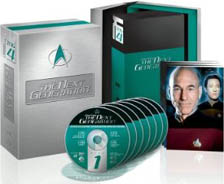Family
Truthfully, I've always had my misgivings about this episode. I think
Gene Roddenberry's concerns about it were correctly justified, when he
worried that people would tune in for sci-fi adventure and find only a quiet
character story at work. I certainly found it to be a dull instalment
back when I first saw it. In retrospect, I've mellowed considerably
towards the intention of it. With the Enterprise finding itself orbiting
Earth at the end of the big Borg adventure, it seems natural and logical
for them to rest and recuperate, engage in shore leave activities, and explore
family and heritage. In Picard's case, it makes extra sense to process
whatever it was that happened to him, and find out if the old character
we loved is still in there somewhere.
However, I still don't think this episode is good. Very little
drive or sense of anticipation is built up around the ideas that it tackles,
and many of the turning points that characters take regarding their issues
turn out to be quite inorganic and clumsy.
Picard's earliest scene on the ship with Troi is a bit of a pain, as it
echoes a problem often seen with psychiatry and self-help material.
In searching keenly for a problem or issue which may not exist, one
could inadvertently create one out of thin air, or strengthen one
that previously had little power. As we watch this dynamic play out,
it feels kind of creepy and icky, instead of the "profoundly wise"
that it was probably aiming for.
The exteriors of the vineyard in France are one of the highlights of
the episode, particularly as many beautiful matte shots update the scenery
for the 24th century. The final shot is particularly exquisite, as we
get not a random starscape, but one which prominently features the Orion
constellation. Sweet! I also like the subplot with Picard's old friend
Louis sounding him out on a new career possibility. It brings up
a neat futuristic sci-fi idea - that of raising the ocean floor and creating
more land, while also pressing Picard with a choice - to continue in Starfleet
or move on to other projects. This gives Picard's part of the story some
much needed structure and backbone, plus a bit of time pressure.
The sentiments of Picard's brother Robert were fairly oblique to me when
I first saw this, but make a bit more sense now in retrospect. It is
additionally interesting how this story complements the previous one -
as Picard, Riker and crew struggle to find some technological
advantage so fresh that it will be beyond the Borg's ability to
adapt quickly enough, there are people on the Earth that they are
protecting who swear by the old ways of the past, shunning all those new,
not-yet-properly-tested-and-proven advances. For sure there are
a few good moments when the two philosophies clash, and Patrick Stewart
and Jeremy Kemp can more subtly chew the scenery over it.
All that said, it remains hard to believe that Robert is a sentient adult
of the 24th century, so keen to blame others for the bizarre bug he wedged
up his own butt. But what really fails is the contrast between how entrenched
he is in these ways and the subsequent ease with which he lets these views
collapse after the vaguest of triggers.
In fact, it feels to me like the critical sequence resolving this story
strand is far too inorganic to be believable. It has instead been contrived
to meet standard scripting requirements and timing.
Were the brothers' arguments really so entrenched
that they would resort to a mud-wrestling fight over it all? (And the
tiny patch of really thin mud feels extremely fake as well.)
Would Picard really break down and bawl over his own Borg victimhood
at that moment? Would it really be a bout of wallowing in that victimhood
that puts his head back together so he can reassert his captaincy?
(I'm thinking it would more likely reinforce his phobias, and that
he needs instead to discover his capacity to decisively help others
and feel his own worth to get to the place that this script wants
to leave him in.) And how does this display of "Humanness" transform
Robert's attitudes with such a clean 180 degree turn? Or was he faking
his pigheadedness all along to trigger Picard's outburst, believing
it was the best way to cure his brother? This story just didn't feel
all that real to me on its main dramatic turns.
Worf also has a subplot here, which does feel to be conjured out of
the air as a thin excuse for some drama. As much as it is nice to
finally see his parents, and get some insight into his adopted background
in Russia, the bug up Worf's butt doesn't feel quite justified either
in its existence, or in its sudden vanishing at the end.
And very, very easily forgotten is this episode's third plot strand,
concerning Wesley's father. It's just sort of there, with no real
dramatic drive to it... a few neat lines buried in a sea of bland ones.
Ho hum.
Perhaps one of the most curious questions about season four
first shows itself at the very beginning of this episode,
and it concern's Riker's rank.
We know Starfleet has plenty of reason to believe that
Riker is qualified to be a captain, and we see him promoted to
"the field rank of captain" in the opening episode,
complete with the four pips on his uniform collar.
Then without any due process,
he is suddenly back down to three pips in his first scene for this story,
indicating a rank of commander, and no mention of how all this was arrived
at. Weird..... I'd certainly have preferred some discussion of this
over and above Wesley's plot strand any day.
Well, this episode isn't too bad, but was far from a great instalment
of Star Trek. The thing is, this is about the only time an idea like this
could be attempted with some feeling of continuity, so I don't mind that
they tried it. It's just too bad it didn't get pulled off in ways that
really drew the audience in better and satisfied them.
| 







 (regular)
(regular)



